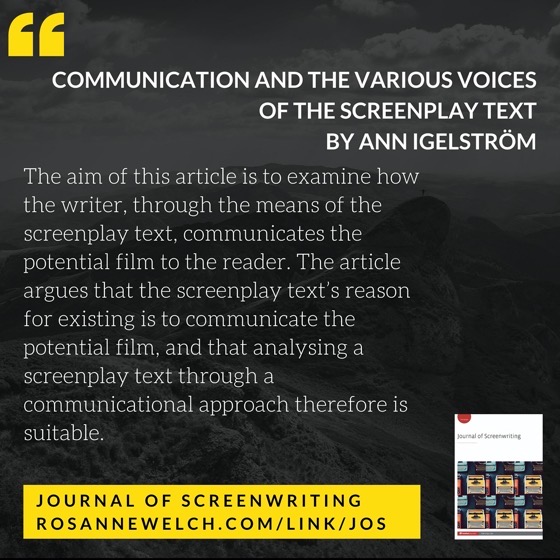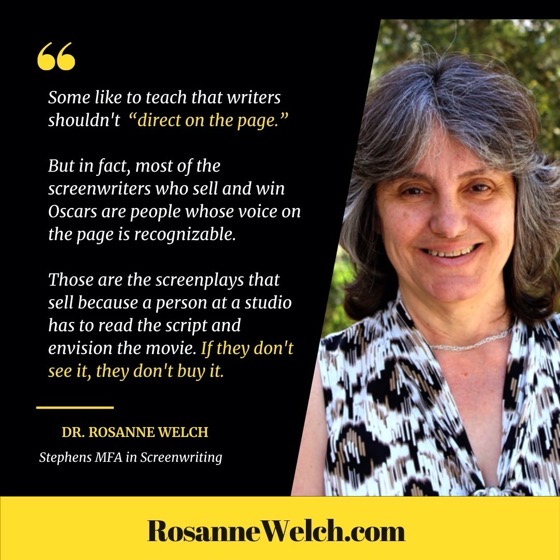Watch this entire presentation
Subscribe to Rosanne’s Channel and receive notice of each new video!
Transcript:
So now, in reading screenplays, people can appreciate the voice of the writer in a way they were never able to before. So we see this movement going on which is very important to me. Again, why does this matter? Because we stand on the shoulders of all the people who came before us in this business. We owe them understanding who they are and what they had to offer. In my mind, we have to honor them the same way he honors his ancestors in this movie. That’s what we’re all about if you ask me. So when i teach in this program, this is why these words mean something to me. WRITE, so you can REACH other people and REPRESENT the cultures and the stories that have not been told before. That, to me, is something that we should be very excited about. That’s why researching screenwriters has always mattered. I’m Rosanne Welch I approve this message. Thank you very much.
Watch this entire presentation
A Note About This Presentation
A clip from my keynote speech at the 10th Screenwriters´(hi)Stories Seminar for the interdisciplinary Graduation Program in “Education, Art, and History of Culture”, in Mackenzie Presbyterian University, at São Paulo, SP, Brazil, focused on the topic “Why Researching Screenwriters (has Always) Mattered.” I was especially pleased with the passion these young scholars have toward screenwriting and it’s importance in transmitting culture across the man-made borders of our world.
To understand the world we have to understand its stories and to understand the world’s stories we must understand the world’s storytellers. A century ago and longer those people would have been the novelists of any particular country but since the invention of film, the storytellers who reach the most people with their ideas and their lessons have been the screenwriters. My teaching philosophy is that: Words matter, Writers matter, and Women writers matte, r so women writers are my focus because they have been the far less researched and yet they are over half the population. We cannot tell the stories of the people until we know what stories the mothers have passed down to their children. Those are the stories that last. Now is the time to research screenwriters of all cultures and the stories they tell because people are finally recognizing the work of writers and appreciating how their favorite stories took shape on the page long before they were cast, or filmed, or edited. But also because streaming services make the stories of many cultures now available to a much wider world than ever before.
Many thanks to Glaucia Davino for the invitation.
* A portion of each sale from Amazon.com directly supports our blogs
** Many of these books may be available from your local library. Check it out!
† Available from the LA Public Library
Podcast: Play in new window | Download
Subscribe: RSS
![49 Appreciating The Voice Of The Writer from Why Researching Screenwriters Has Always Mattered [Video] (1 minute 2 seconds)](https://rosannewelch.com/wp-content/uploads/2021/02/rmw-sao-paolo-49.png)



![10 The Writer’s Voice from There And Back Again: Writing and Developing for American TV [Video] (1 minute 3 seconds)](https://rosannewelch.com/wp-content/uploads/2021/02/rmw-oxford-brookes-10.png)
![Stephens College MFA Alumni Chase Thompson and Michael Burke Talk About Their MFA Experience on the Starcatcher Podcast [Audio Except]](https://rosannewelch.com/wp-content/uploads/2021/01/RMW-Rosanne-Signature-for-Web.png)
![Stephens College MFA Alumni Chase Thompson and Michael Burke Talk About Their MFA Experience on the Starcatcher Podcast [Audio Except]](https://rosannewelch.com/wp-content/uploads/2021/02/starcatcher-106-burke-mfa.jpg)



![48 Directing On The Page from Why Researching Screenwriters Has Always Mattered [Video] (1 minute 3 seconds)](https://rosannewelch.com/wp-content/uploads/2021/02/rmw-sao-paolo-48.png)
